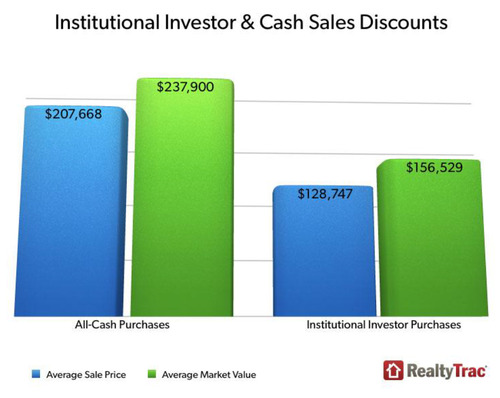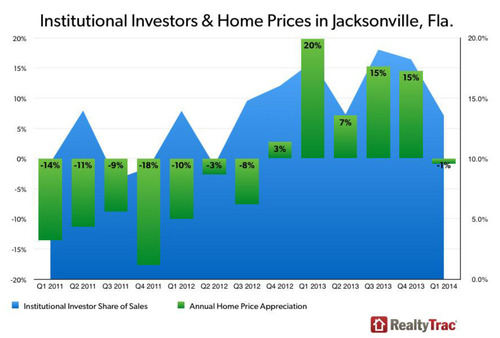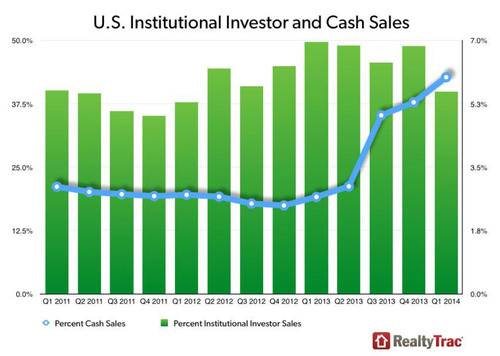The WPJ
THE WORLD PROPERTY JOURNALReal Estate Facts Not Fiction
Residential Real Estate News

All-Cash Buyers Reach Record High in U.S.
Residential News » North America Residential News Edition | By Michael Gerrity | May 8, 2014 1:15 AM ET
Cash has becoming king in the U.S. housing market these days, according to a new report released this week by RealtyTrac.
Based on RealtyTrac's new U.S. Institutional Investor & Cash Sales Report for Q1, 2014, the share of all-cash sales reached a new high in the first quarter even as the share of institutional investor purchases dropped to the lowest level since the first quarter of 2012.
 The report shows 42.7 percent of all U.S. residential property sales in the first quarter were all-cash purchases, up from 37.8 percent in the previous quarter and up from 19.1 percent in the first quarter of 2013 to the highest level since RealtyTrac began tracking all-cash purchases in the first quarter of 2011.
The report shows 42.7 percent of all U.S. residential property sales in the first quarter were all-cash purchases, up from 37.8 percent in the previous quarter and up from 19.1 percent in the first quarter of 2013 to the highest level since RealtyTrac began tracking all-cash purchases in the first quarter of 2011.Institutional investors -- entities that have purchased at least 10 properties in a calendar year -- accounted for 5.6 percent of all U.S. residential sales in the first quarter, down from 6.8 percent in the fourth quarter of 2013 and down from 7.0 percent in the first quarter of 2013 to the lowest level since the first quarter of 2012.
"Strict lending standards combined with low inventory continue to give the advantage to investors and other cash buyers in this housing market," said Daren Blomquist, vice president at RealtyTrac. "The good news is that as institutional investors pull back their purchasing in many markets across the country, there is still strong demand from other cash buyers -- including individual investors, second-home buyers and even owner-occupant buyers -- to fill the vacuum of demand left by institutional investors.
"While the institutional investor purchase share declined in the first quarter in 18 of the top 20 markets for institutional investor share a year ago, home prices continued to appreciate in most of those markets, albeit at a slower pace in many cases," Blomquist continued. "There are a couple notable exceptions that could be cause for concern: Jacksonville, Fla., where the institutional investor share of purchases was down to 13.5 percent in the first quarter compared to 18 percent a year ago and where median home prices decreased 1 percent from a year ago in March after 15 consecutive months of annual increases; and Greensboro, N.C., where the institutional investor of purchases was down to 6.4 percent in the first quarter compared to 10 percent a year ago and where median home prices decreased 8 percent from a year ago in March following 14 of 16 months were median home prices increased annually."
Cash sales more than half of all sales in Miami, New York, Detroit, Atlanta and Las Vegas
Among metropolitan statistical areas with a population of at least 500,000, those with the top five highest percentages of cash sales were all in Florida: Cape Coral-Fort Myers, (73.6 percent), Miami (67.1 percent), Sarasota, (65.1 percent), Palm Bay, (64.1 percent), and Lakeland, (61.8 percent).
 Other major metro areas with more than 50 percent all-cash sales included New York (57.0 percent), Columbia, S.C., (56.1 percent), Memphis (54.9 percent), Detroit (53.5 percent), Atlanta (53.2 percent) and Las Vegas (52.2 percent).
Other major metro areas with more than 50 percent all-cash sales included New York (57.0 percent), Columbia, S.C., (56.1 percent), Memphis (54.9 percent), Detroit (53.5 percent), Atlanta (53.2 percent) and Las Vegas (52.2 percent)."The cash buyer segment of the Northern Nevada housing market is very strong. More than 50 percent of transactions in our Reno office were cash sales. High-end home sales are strong as well, and we typically see a higher percentage of those buyers purchase with cash," said Craig King, COO of Chase International, covering the Lake Tahoe and Reno, Nev., markets. "As the level of inventory dwindles in the price points sought after by investors, so do the number of investor sales. We continue to see a strong interest from investors, but the inventory to support the demand just isn't there."
"The Ohio housing market is experiencing low available inventory, which has created heightened competition amongst investors positioning for investment purchases on an institutional and individual basis," said Michael Mahon, executive vice president/broker at HER Realtors, covering the Cincinnati, Columbus and Dayton, Ohio, markets. "Due to this heightened competition, we have equally noticed an increase in cash sales during the first quarter of 2014, as a negotiation tactic in capturing inventory on more advantageous pricing terms. Institutional investors maintained their active roles in purchasing Ohio housing inventory, contributing to increases in equity and property values across the state."
Other high-level findings from cash purchases data:
- 15 percent of all-cash purchases in the first quarter were properties in the foreclosure process, and 10 percent were bank-owned properties.
- 11 percent of all-cash purchases in the first quarter were to institutional investors, investors buying at least 10 properties in a calendar year.
- 52 percent of all-cash purchases in March (most recent month's data only available for this metric) were sold to buyers with a different mailing address than the property address -- indicating investors or second-home buyers. That compares to 34 percent of all sales -- cash and financed -- sold to investors or second-home buyers in March.
- The average sales price of an all-cash purchase in the first quarter was $207,668 -- 13 percent below the average estimated full market value of the properties that were purchased: $237,900.
Institutional investor share up in San Francisco, Dallas, Miami, Atlanta and Las Vegas
Among metropolitan statistical areas with a population of at least 500,000, those with the biggest annual increase in share of institutional investor purchases were Baton Rouge, La., (up 131 percent), San Francisco (up 92 percent), McAllen, Texas (up 62 percent), Allentown, Pa., (up 49 percent), and Omaha, Neb., (up 49 percent).
 Other major metro areas with an annual increase in the share of institutional investor purchases included Dallas-Fort Worth (up 45 percent), Miami (up 8 percent), Atlanta (up 38 percent), Minneapolis (up 8 percent), Tampa (up 17 percent), San Antonio (up 25 percent), and Las Vegas (up 24 percent).
Other major metro areas with an annual increase in the share of institutional investor purchases included Dallas-Fort Worth (up 45 percent), Miami (up 8 percent), Atlanta (up 38 percent), Minneapolis (up 8 percent), Tampa (up 17 percent), San Antonio (up 25 percent), and Las Vegas (up 24 percent).Major metro areas with an annual decrease in the share of institutional investor purchases included New York (down 44 percent), Los Angeles (down 80 percent), Chicago (down 41 percent), Washington, D.C. (down 52 percent) and Phoenix (down 14 percent).
"Institutional investors have bought up much of the affordable inventory they are traditionally interested in, which explains the decrease in institutional investor sales," said Chris Pollinger, senior vice president of sales at First Team Real Estate, covering the Southern California market. "We are seeing a rise in foreign buyers purchasing high-end homes, which is contributing to the rise in all-cash purchases.
"Inventory shortages as well as lending regulations favor the all-cash buyer, which explains the increase in cash sales on both a national and local level," Pollinger added.
"There just aren't as many listings to satisfy the demands of institutional investors in the Oklahoma market. REO Listing inventory is down 50% in Oklahoma City from a year ago and down 20% in Tulsa," said Sheldon Detrick, CEO of Prudential Detrick/Alliance Realty, covering the Oklahoma City and Tulsa, Okla. markets. "So you have more investors chasing a much smaller pie; resulting in multiple offers and higher sales prices."
Other high-level findings from institutional investor data:
- 84 percent of all institutional investor purchases were all-cash purchases in the first quarter.
- 35 percent of institutional investor purchases were properties built in 2000 or later, and 50 percent were built in 1990 or later.
- 30 percent of all institutional investor purchases were properties in the foreclosure process, and 15 percent were bank-owned properties.
- The average sales price of institutional investor purchases in the first quarter was $128,747 -- 18 percent below the average "after repair" estimated market value of the homes being purchased: $156,529.
Sign Up Free | The WPJ Weekly Newsletter
Relevant real estate news.
Actionable market intelligence.
Right to your inbox every week.
Real Estate Listings Showcase
Related News Stories
Residential Real Estate Headlines
- U.S. New-Home Sales Surge in August as Mortgage Rates Ease
- Despite Increased Foreign Buyer Activity, Miami Residential Sales Dip 11 Percent in August
- California Home Sales Enjoy Modest Uptick as Mortgage Rates Ease
- U.S. Home-Flipping Profits Sink to Lowest Level Since 2008 Financial Crisis as Costs Climb
- Why the World's Rich Are Flocking to Europe in 2025
- Federal Reserve Delivers First Rate Cut of 2025 as Mortgage Relief Proves Limited
- Homebuilder Sentiment Holds Steady in U.S. as Rate-Cut Bets Lift Outlook
- U.S. Mortgage Rates Experience Sharpest Weekly Drop in Over a Year
- U.S. Foreclosures Rise for Sixth Straight Month as Affordability Pressures Mount
- Black U.S. Homeownership Rate Falls to Two-Year Low as Job Losses Mount
- Las Vegas Home Prices Flatten as Listings Surge, Sales Slow
- Cooling Miami Housing Market Sees 16 Percent Annual Sales Drop in July
- U.S. Mortgage Delinquencies Uptick in June Amid Regional Pressures
- California, Florida Top U.S. Housing Markets Most at Risk of Downturn
- 30-Year Mortgage Drops to 6.56 Percent in Late August, Lowest Since October 2024
- Investors Maintain Elevated Role in U.S. Housing Market Despite Slight Pullback
- Pending Home Sales Show Mixed Signals as U.S. Buyers Remain Cautious
- Canadian Home Sales Extend Recovery in July
- U.S. Home Sales Rise in July as Buyers Gain More Bargaining Power
- Zombie Foreclosures Edge Up Across U.S.
- 2.6 Million Homes at Wildfire Risk Across 14 Western States in 2025
- One in Five Americans Willing to Trade Personal Safety for Home Affordability
- U.S. Home Price Growth Slows as Affordability Pressures Mount in 2025
- U.S. Mortgage Rates Dip to Four Month Low in Early August
- U.S. Mortgage Applications Rise in Late July, Breaking Four-Week Slump
- Hong Kong's Housing Market Stuck in Stalemate as Bulls and Bears Face Off
- U.S. Condo Market Struggles in 2025
- U.S. Pending Home Sales Remain Sluggish in June
- Los Angeles Area Wildfires Destroyed Nearly $52 Billion in Homes Last January
- Greater Palm Beach Area Residential Sales Slip in June Amid Growing Inventory
- Economic Resilience Lifts U.S. Housing Outlook Going Forward
- New Home Sales Stagnate as Affordability Struggles Continue in America
- U.S. Housing Market Slips in June as Prices Hit New Highs
- Florida, California Continue to Reign Supreme as America's Ultraluxury Housing Markets
- Caribbean Housing Market Evolves into Global Second-Home Hotspot
- U.S. Home Sales See Highest June Cancellation Rate on Record
- Orlando Housing Market Cools in June as Listings Slide, Sales Slow
- Private Credit Surges in 2025 as Real Estate Developers Bypass Banks
- U.S. Condo Market Suffers Sharpest Price Drops in Over a Decade as Buyers Retreat
- Rising Taxes, Insurance Costs Undermine the Stability of U.S. Homeownership
Reader Poll
Marketplace Links
This website uses cookies to improve user experience. By using our website you consent in accordance with our Cookie Policy. Read More







